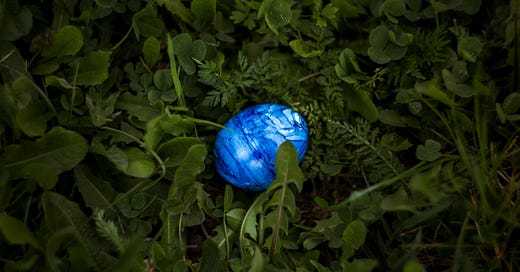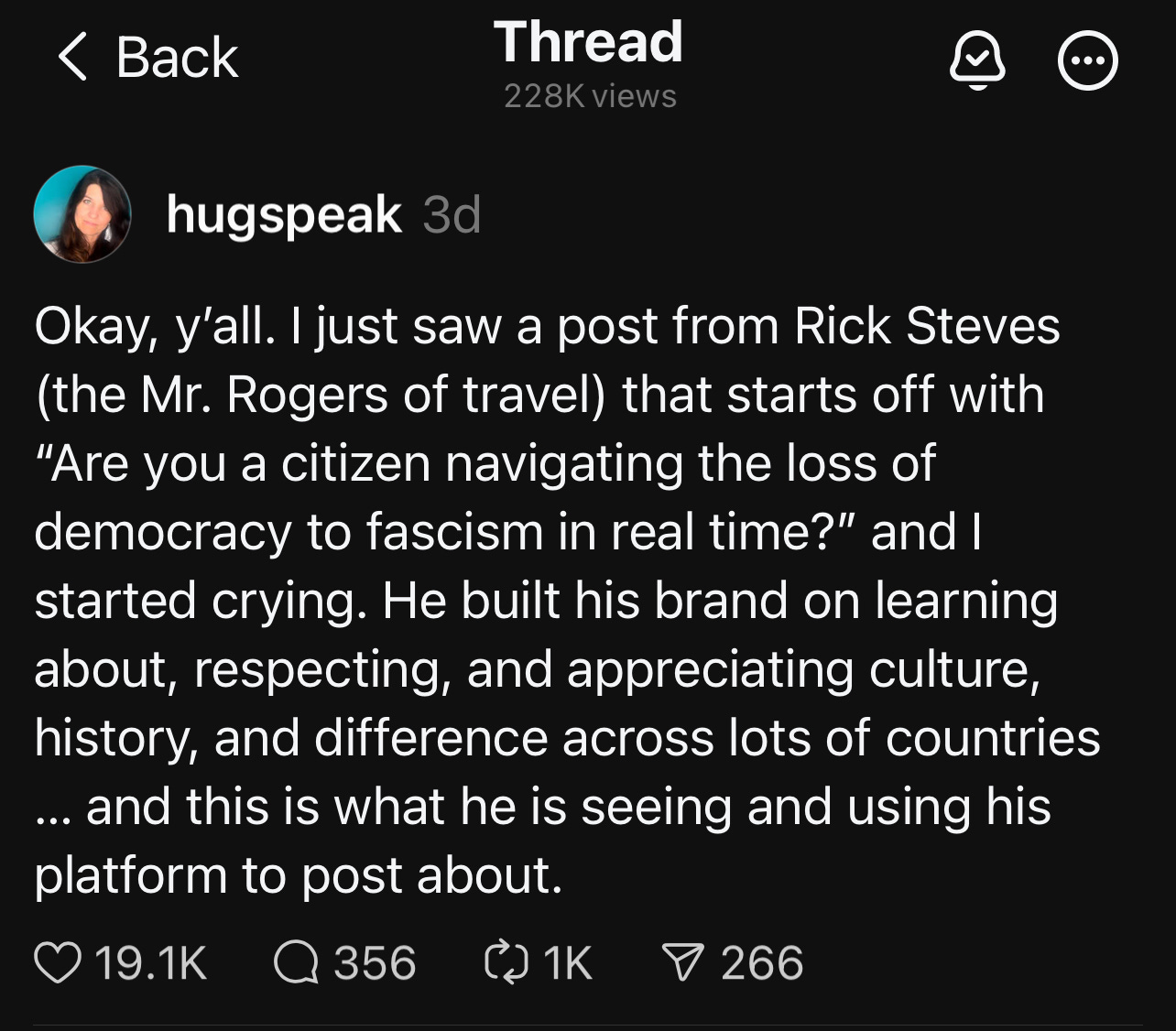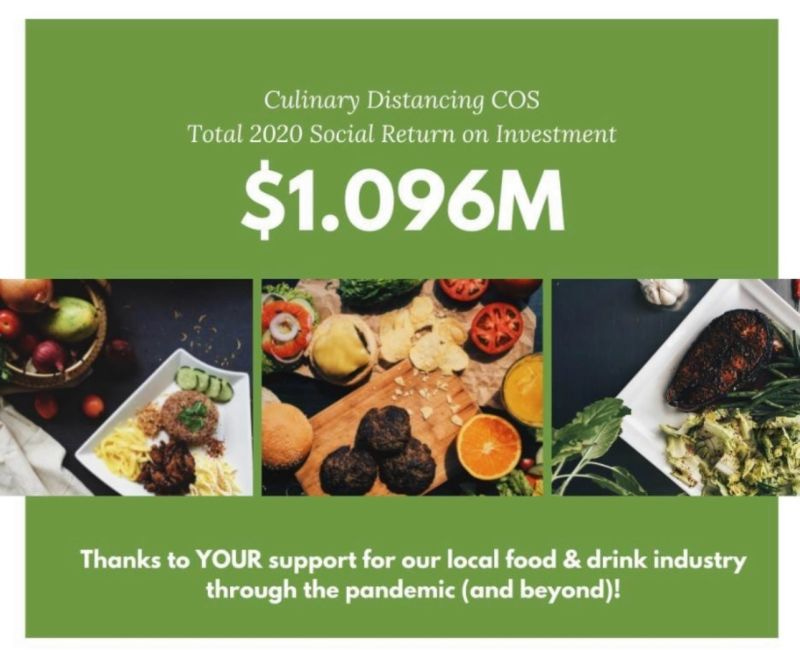“Are you a citizen navigating the loss of democracy to fascism in real time? Do you need help articulating what the hell’s going on? You’re not alone!”
That was the header on a recent Facebook post by Rick Steves, a beloved public television travel show host and author of a slew of guides designed to help travelers truly understand, appreciate, experience, and respect a country’s people, history, culture, and language.
I first discovered Rick 20+ years ago when I was planning excursions across Europe from my temporary home base while earning my Master of Law at University College London. Before I left the States for my year abroad, I watched several of Rick’s episodes to decide which places I wanted to prioritize. My then-husband bought guides for our top choices.
Rick became our travel buddy. His voice guided us through history lessons and walking tours in city after city. He gave us a deeper understanding, one we didn’t quite achieve in the places we visited that weren’t covered by one of his guides. Sometimes he drew explicit connections between the experiences of the people and places we were visiting with American history and present. Traveling “with” him (at the same time I was studying comparative constitutional law and international rights) helped me see myself in global context.
Most recently, my partner and I used Rick’s Portugal guide for a beautiful trip last November — a trip that spanned Election Day. The guide spends a lot of time explaining what life was like under the Salazar dictatorship. It also highlights sites and memorials to victims of the Portuguese Inquisition, people persecuted and massacred because of their faith and ethnicity as scapegoats to consolidate power in the hands of a few.
As wonderful as Portugal is, a shadow hung over the trip. It was hard not to worry about history repeating itself — this time at home.
When I saw Rick’s post a few days ago. I cried. His brand and business is all about learning from the people and places he visits — many of which have suffered under fascism and pushed back against it — and, he’s seeing the rise of fascism in America. He’s using his digital platform to speak up.
I took to Threads to share my reaction.
It struck a chord. As of publication time, the post has been viewed 228,000 times with more than 350 comments.
People are sharing their love for Rick, things they’ve learned from him, and personal stories of encounters with him where he demonstrated his commitment to treating everyone with dignity and respect.
They also shared works of his that they felt were especially important right now:
A one hour special, Fascism in Europe, and the accompanying explanation of why he decided to make the special in 2018 (during the first term of the current American president).
His book Travel as a Political Act that covers lessons we can learn from other countries and culture (as well as an episode with the same title + a special episode regarding the 2024 elections).
His appearance on The Bulletin podcast, a weekly current events show from Christianity Today, where he talks about how faith informs his travels, and how a posture of pilgrimage forms better global citizens.
Several people commenting on the thread discovered they had been in the same physical place with each other and with Rick at various times in the past few weeks.
We are finding each other with this social media post.
People who care about other humans (celebrating difference and uniting in shared humanity), who care about systems that allow everyone to thrive, and who care about being better global citizens together are finding each other in this ephemeral space created by the post. A space made possible because Rick chose to share his thoughts and heart via social media. (If you use Facebook, I highly recommend giving Rick a follow. He routinely posts clear-eyed, yet uplifting takes on what is happening.)
While this particular post is an outlier in terms of “engagement,” it isn’t special. These connections happen every time we share glimpses of our hearts in digital spaces.
Every time we choose to share ourselves on social media, we reach someone who needed whatever we shared.
And making one person feel seen, understood, and less alone matters.
As I was working on this newsletter in a local coffee shop, a friend I hadn’t seen in a long time walked in. She told me she appreciated what I was pouring into digital spaces. She didn’t have the bandwidth to “engage” with it online, but she was seeing it, and it mattered to her.
I believe in the power of social media to lift us up and bring us together because I hear things like this all the time. I’m fortunate to live in a community where I’m connected physically to many of those I’m also connected with in digital spaces, so I regularly run into people who tell me what I do on social media matters to them.
I know not everyone has that in-person or even digital validation that people care about what you post. Please accept this validation from me.
Your social media posts matter.
Over time, you will find the others who need what you share and who you need as well.
“Find the others” is a phrase that has been forefront in my mind a lot over the past few months. I can’t remember where I first heard it or why I started saying it so much, but I know it pops up frequently around the work Jon Alexander, author of CITIZENS: Why the Key to Fixing Everything is All of Us, and co-founder of the Citizen Collective, a community of people leading and learning for a #CitizenFuture.
“Find the Others!” is the title of this Accidental Podcast featuring Jon.
The subtitle is: Beyond the Death of Democracy Lies Citizen Power.
The episode focuses on the hope of this moment in history when it is blatantly obvious that the old systems aren’t working to protect everyone and create conditions where all of us thrive. It asks: “What new light is there at the end of the tunnel and how do we find the agency, motivation and connections to the people and places we love, to make the changes that need to happen if we're to create that future we'd be proud to leave behind?”
My partial answer to the question is: we find each other by sharing ourselves in digital spaces — connecting with people far beyond our geographical location and signaling to those in our physical world that we are with them in longing for and building something better.
Virtual hugs to you all.
Lauren
ADDITION TO LAST WEEK’S NEWSLETTER
Mere moments after I published the newsletter titled Don’t Post Sources about crafting informational posts in ways the algorithms won’t kill and that won’t immediately trigger rejection by people who need the info most, I saw a post from Nate Shalev, a voice I greatly respect, that did a much better job detailing a workaround. Their key points about what to do instead of hitting “repost”:
✔️ Write your own post.
✔️ Tag the original creator.
✔️ Add a link to their post in the comments. (Here’s the link to their post.)
I wanted to clarify that my last newsletter was aimed at sharing news and factual information, not artistic expression or commentary, which should always carry attribution.
Generally, I advise against changing digital behavior to comply with the algorithms, and citing sources is part of my academic and professional ethos, but as the need to cut through dis/misinformation has grown far more serious, I'm looking for every ethical way to get info out there. I’d love to hear from you about any methods or tactics of disseminating accurate information that have been working for you.
MISCELLANEA
Speaking of misinformation, my friend Matt Kaskavitch, Senior Digital Marketing Specialist at Medtronic (and the writer of the foreword to my book Digital Kindness), posted excellent advice on how medical and health communicators can address misinformation on social media. The key points I think are relevant to everyone (medical pro or not) are: 1) share research in digital spaces responsibly, and 2) we need more leaders entering the digital conversation themselves, not just through their institutions. Here’s a link to his post. Let him know his work matters to you by leaving a comment on it.
Five years ago Matthew Schniper and I launched Culinary Distancing COS (now Culinary Colorado Springs) as the fastest and simplest way we could think of to support local food and drink businesses during imminent shutdowns of on-site dining due to COVID. We knew it would have some impact — digital interactions spill over into physical actions far more than many people realize — but we weren’t sure how much impact it could have without significant investment of resources. A social return on investment study showed that in one year, it had an impact of $1.1 million dollars. A simple Facebook group — a digital space for local food and drink lovers to connect with industry professionals and owners of restaurants, coffee shops, breweries, etc. — had that much impact. If you’re interested in seeing the case study reports or want some help exploring how to incorporate community-based strategies into your organization’s approach, let me know.
Three years ago I co-authored part of a best practices guide for strengthening democracy through digital communication published by the European Digital Diplomacy Exchange (a publication funded in part and supported by the US State Department in recognition of the crucial role digital communication plays in preserving democracy). Recently, the US was the only country to vote no on the UN resolution "Education for Democracy" (emphasizing that an inclusive education system empowers individuals and strengthens governance institutions, calling for investments in quality education and lifelong learning, and urging Member States to harness the potential of digital technologies to advance education for democracy). This vote represents a change in US support for education, learning, and digital technologies that strengthen democracy.
SOCIAL MEDIA JOY
I’m loving the videos of Ume, this rare and endangered tapir calf at Point Defiance Zoo & Aquarium. She’s adorable and hilarious! Several of my friends are watching the bald eaglet cams. Are any baby animals bringing joy to your feeds?







